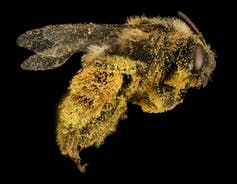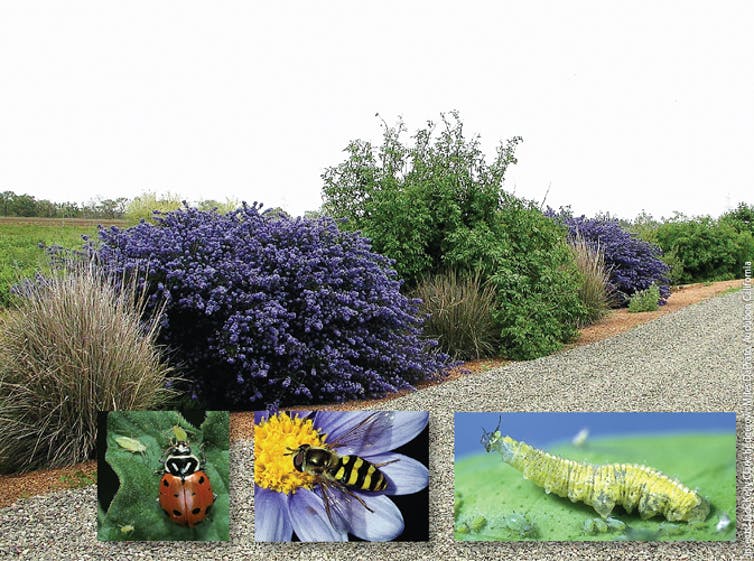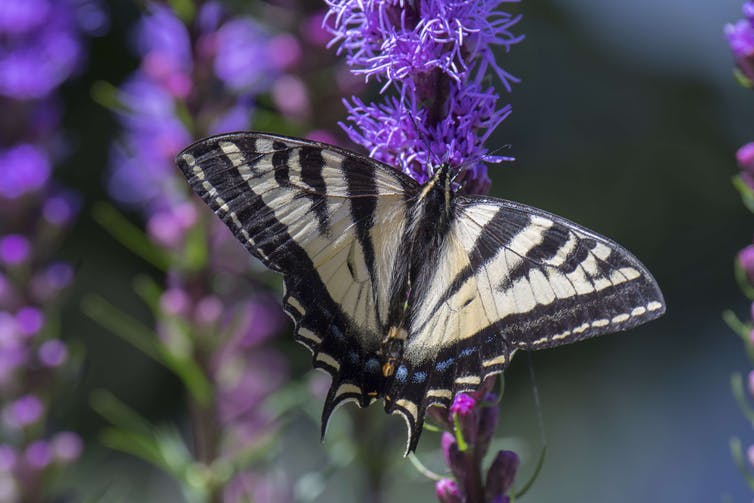
As spring expands across North America, trees, shrubs and flowers are releasing pollen. This fine, powdery substance is produced by the male structures of cone-bearing and flowering plants. When it’s carried to the plants’ female structures by wind, water or pollinators, fertilization happens.
As pollen travels, it also triggers allergies in some 25 million Americans. Pollen exposure can cause sneezing, coughing, itchy eyes, runny nose and postnasal drip – unwelcome signs of spring for sufferers. This roundup of articles from our archives describes recent findings on protecting pollinators and coping with pollen season.
Table of Contents
1. Hey pollinators, over here
Since pollen grains carry the cells that fertilize plants, it’s critical for them to get where they need to go. Often wind or gravity is all it takes, but for many plants, a pollinator has to carry the pollen grains. Some plants offer nectar or edible pollen to attract insects, bats or other animals, which carry pollen from plant to plant as they forage. Many flowers also lure pollinators with scent.

Dejen Mengis, USGS
“Similar to the perfumes at a department store counter, flower scents are made up from a large and diverse number of chemicals which evaporate easily and float through the air,” writes Mississippi State University horticulturalist Richard L. Harkess. “To differentiate itself from other flowers, each species’ flowers put out a unique scent to attract specific pollinators. … Once pollinated, the flower stops producing a floral scent and nectar and redirects its energy to the fertilized embryo that will become the seed.”
Read more:
Why do flowers smell?
2. Bees at the buffet
It’s well known that many species of insects have declined in recent years. One big focus is honeybees and other species of bees, which pollinate many important crops.
In a 2021 study, University of Florida agricultural extension specialist Hamutahl Cohen found that when bees visited fields where sunflowers, grown as crops, were blooming over many acres, they picked up parasites at a high rate. In contrast, bees that foraged in hedgerows around crop fields and could choose from diverse types of flowers to feed on spread out farther and had lower rates of infection.

UCANR, CC BY-ND
“The more bees in sunflower fields, the more parasites,” Cohen observed. “Sunflower blooms were aggregating bees, which in turn was amplifying disease risk.” However, “in the presence of many flower types, bees disperse and spread across resources, reducing each individual bee’s likelihood of encountering an infected individual.”
Read more:
Planting mixes of flowers around farm fields helps keep bees healthy
3. Warmer weather means more pollen
As climate change raises average temperatures across the U.S., growing seasons are starting earlier and ending later in the year. That’s bad news for allergy sufferers.
“The higher temperature will extend the growing season, giving plants more time to emit pollen and reproduce,” write University of Michigan atmospheric scientists Yingxiao Zhang and Allison L. Steiner. And by increasing the concentration of carbon dioxide in Earth’s atmosphere, climate change will make it possible for plants to grow larger and generate more pollen.
“Southeastern regions, including Florida, Georgia and South Carolina, can expect large grass and weed pollen increases in the future. The Pacific Northwest is likely to see peak pollen season a month earlier because of the early pollen season of alder,” Zhang and Steiner report.
4. Providing better forecasts
With all that pollen out there, how can allergy sufferers know when counts are high? Today the U.S. has only a rudimentary network of 90 pollen observation stations across the country, staffed by volunteers and run only during pollen season, so often there isn’t good information available when people need it.
Fiona Lo, an environmental health scientist at the University of Washington, is working with colleagues to develop a model that can predict airborne pollen releases. “Our forecast can predict for specific pollen types because our model includes information about how each plant type interacts differently with the environment,” Lo reports.
So far, the model only predicts levels of four types of common pollen in areas where there are observation stations. Ultimately, though, Lo and her collaborators “want to provide a forecast every day during pollen season to give allergy sufferers the information they need to manage their symptoms. Allergies are often undertreated, and knowledge about self-care is limited, so a reliable pollen forecast that is easy to access – for example, via an app on your phone – along with education on allergy management, could really help allergy sufferers.”
5. Support pollinators in your garden
Pollen season is also gardening season, since it’s when plants are blooming. West Virginia University mycologist Brian Lovett offers advice for gardeners who want to attract beneficial insects to their yards for pollination and other purposes.
One step is to replace grass with native wildflowers, which will provide pollen and nectar for insects like ants, bees and butterflies. “Just as you may have a favorite local restaurant, insects that live around you have a taste for the flowers that are native to their areas,” Lovett notes.

Wolfgang Kaehler/LightRocket via Getty Images
Replacing white lightbulbs with yellow or warm-hued LED bulbs, and providing water in dishes or other containers, are also insect-friendly steps. Local university extension offices and gardening stores can offer other suggestions.
“In my view, humans all too often see ourselves as separate from nature, which leads us to relegate biodiversity to designated parks,” Lovett observes. “In fact, however, we are an important part of the natural world, and we need insects just as much as they need us.”
Read more:
To help insects, make them welcome in your garden – here’s how
[Get fascinating science, health and technology news. Sign up for The Conversation’s weekly science newsletter.]
![]()
























